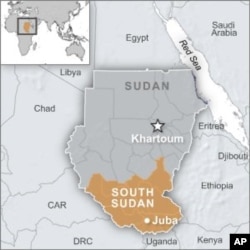Civil war consumed Sudan for all but 11 of its 48 years of independence. The conflict pitted the Muslim north against the primarily Christian and animist south. The second Sudanese civil war lasted nearly twenty-one years and caused untold destruction. More than two million people died, four million were displaced and nearly 600,000 people sought refuge in neighboring countries.
The war came to an end with the signing of the Comprehensive Peace Agreement in January 2005 between the Sudan People's Liberation Movement (SPLM) and the Government of Sudan. It was facilitated through a regional effort by the Inter-Governmental Authority on Development and the international community, namely the United States, the United Kingdom and Norway.
Ezekiel Gatkuoth heads the Mission of the Government of South Sudan to the United States. He says the CPA’s record of achieving its intended objectives has been mixed.
“The Comprehensive Peace Agreement was meant to address two issues. One is democratic transformation – transform Sudan into a better Sudan for all Sudanese. The second is self-determination for the people of southern Sudan. Objective number one, we have failed to achieve. Objective number two, we have achieved, and that’s why we’re going to have the referendum on the 9th of January 2011,” he says.
Gatkuoth blames the failure of the first objective on what he describes as the National Congress Party’s efforts to impose Sharia law and to “Islamize and Arabicize the whole Sudan.”
While the CPA ended more than 20 years of civil war, some say peace in southern Sudan remains fragile, and that the legal structures guaranteeing the rule of law need stregnthening. Gatkuoth disagrees.
“Southern Sudan is at peace,” he says. “We are united and even stronger than before. That’s why you are not hearing anything in southern Sudan, especially fighting or communal violence, things that were sponsored by the north.”
As southern Sudan’s referendum approaches, another element of the CPA, a separate referendum for the future of Abyei, remains unresolved. At issue is whether Misseriya pastoralists, who bring their livestock into the region to graze during the annual dry season, should be allowed to vote. The Ngok Dinka form the majority of Abyei’s permanent residents.
Rabie Obeid of the ruling National Congress Party says all of Abyei’s residents should be allowed to vote in a referendum on the region’s future “regardless of their ethnicity or party.” The government of southern Sudan wants to limit the eligibility to the Ngok Dinkas.
Many in the south say Khartoum is taking steps to undermine the CPA and possibly delay the January 9th referendum. Dr. Obeid refutes the charges, saying the NCP respects the right of southerners to determine their own future, even if they opted for separation.
Reports out of Juba suggest continued delays in the printing of ballots for the upcoming referendum. But southern Sudan’s chief representative in the U.S., Ezekiel Gatkuoth, downplays their significance.
“The (Referendum) Commission is committed to making sure that delays here and there will not affect the 9th of January 2011. So even if there is a delay, it’s not actually a big deal,” he says.
Dr. Obeid of the NCP says he thinks the south Sudan referendum will be carried out on schedule, as long as it adheres to established guidelines.
“It is not a point of carrying out a referendum by hook or crook. That means what’s mentioned in the Referendum Act should be implemented and the Referendum Commission should stick to the provisions of the Referendum Act and the CPA.”
If all these conditions are fulfilled, he says, “the referendum will be carried out.”
Amidst the ongoing debate about next month’s referendum, the south’s ruling party has officially come out in favor of separation from the north. Dr. Obeid criticized the announcement, saying it violates the Comprehensive Peace Agreement and undermines the eventual outcome of the vote.




